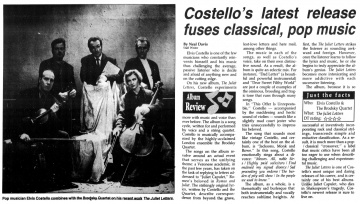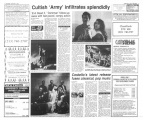USC Daily Trojan, February 22, 1993: Difference between revisions
(start page) |
(,+US publications by state index) |
||
| (5 intermediate revisions by the same user not shown) | |||
| Line 1: | Line 1: | ||
{{Bibliography header}} | {{Bibliography header}} | ||
{{:Bibliography index}} | {{:Bibliography index}} | ||
{{:Daily Trojan index}} | {{:USC Daily Trojan index}} | ||
{{: | {{:California publications index}} | ||
{{:US publications by state index}} | |||
{{Bibliography article header}} | {{Bibliography article header}} | ||
<center><h3> Costello's latest release fuses classical, pop music </h3></center> | <center><h3> Costello's latest release fuses classical, pop music </h3></center> | ||
| Line 9: | Line 10: | ||
---- | ---- | ||
{{Bibliography text}} | {{Bibliography text}} | ||
Elvis Costello is one of the few musicians who constantly reinvents himself and his music thus challenging the average, passive listener who is docile and afraid of anything new and on the cutting edge. | |||
On his new album, ''The Juliet Letters'', Costello experiments more with music and voice than ever before. The album is a song cycle, written for and performed by voice and a string quartet. Costello is musically accompanied by the highly-acclaimed London ensemble the Brodsky Quartet. | |||
The songs on the album revolve around an actual event that serves as the unifying theme: a Veronese academic, in the past few years, has taken on the task of replying to letters addressed to "Juliet Capulet," Romeo's beloved in ''Romeo and Juliet''. The strikingly original lyrics, written by Costello and the Quartet, describe correspondence from beyond the grave, lost-love letters and hate mail, among other things. | |||
The music in each of the songs, as well as Costello's voice, take on their own distinctive sound. As a result, the album is quite an eclectic mix. For instance, "Dead Letter" (a beautiful and powerful instrumental) and "Dear Sweet Filthy World" are just a couple of examples of the ominous, brooding and tragic tone that runs through many songs. | |||
In "This Offer Is Unrepeatable," Costello — accompanied by the maddening and hectic sound of violins — sounds like a slightly mad court jester who tries unsuccessfully to impress his beloved. | |||
The song that sounds most like vintage Costello, and certainly one of the best on the album, is "Jacksons, Monk and Rowe." In this song, Costello emotionally sings about a divorce: ''"Messrs. All, noble Sirs / Highly paid solicitors / Find enclosed my signed divorce / Sad proceeding you endorse / The burden of pity will show / In the people we used to know.” | |||
The album, as a whole, is a thematically sad burlesque that both instrumentally and vocally reaches sublime heights. At first, the ''The Juliet Letters'' strikes the listener as sounding awkward and foreign. However, once the listener learns to follow the lyrics and music, he or she begins to truly appreciate the album's genius. ''The Juliet Letters'' becomes more intoxicating and more addictive with each successive listening. | |||
The album, because it is so successful at inventively incorporating rock and classical stylings, transcends simple and reductive classification. As a result, it is much more than a pop / classical "crossover," a label that music critics have been all too eager to use when describing challenging and experimental music. | |||
''The Juliet Letters'' is one of Costello's most unique and daring releases of his career, and is certainly one of his best albums. Unlike Juliet Capulet, who dies in Shakespeare's tragedy, Costello's newest release is sure to live on. | |||
{{cx}} | {{cx}} | ||
| Line 16: | Line 33: | ||
{{Bibliography notes}} | {{Bibliography notes}} | ||
'''Daily Trojan, February 22, 1993 | '''The Daily Trojan, February 22, 1993 | ||
---- | ---- | ||
[[Neal Davis]] reviews ''[[The Juliet Letters]]''. | [[Neal Davis]] reviews ''[[The Juliet Letters]]''. | ||
| Line 22: | Line 39: | ||
{{Bibliography images}} | {{Bibliography images}} | ||
[[image:1993-02-22 Daily Trojan pages 08-09.jpg|x120px|border]] | [[image:1993-02-22 USC Daily Trojan clipping 01.jpg|360px|border]] | ||
<br><small>Page | <br><small>Clipping.</small> | ||
[[image:1993-02-22 USC Daily Trojan pages 08-09.jpg|x120px|border]] | |||
<br><small>Page scan.</small> | |||
{{Bibliography notes footer}} | {{Bibliography notes footer}} | ||
| Line 33: | Line 53: | ||
*[http://en.wikipedia.org/wiki/Daily_Trojan Wikipedia: Daily Trojan] | *[http://en.wikipedia.org/wiki/Daily_Trojan Wikipedia: Daily Trojan] | ||
{{DEFAULTSORT:Daily Trojan 1993-02-22}} | {{DEFAULTSORT:USC Daily Trojan 1993-02-22}} | ||
[[Category:Bibliography]] | [[Category:Bibliography]] | ||
[[Category:Bibliography 1993]] | [[Category:Bibliography 1993]] | ||
[[Category:Daily Trojan| Daily Trojan 1993-02-22]] | [[Category:USC Daily Trojan| USC Daily Trojan 1993-02-22]] | ||
[[Category:Newspaper articles]] | [[Category:Newspaper articles]] | ||
[[Category:Album reviews]] | [[Category:Album reviews]] | ||
[[Category:The Juliet Letters reviews]] | [[Category:The Juliet Letters reviews]] | ||
Latest revision as of 02:25, 13 August 2018
|

